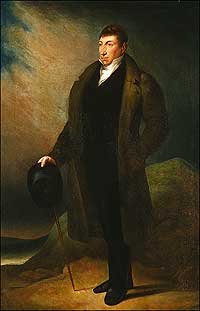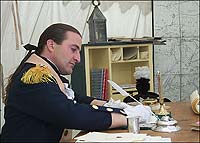Page content
The Marquis de Lafayette

Portrait of the Marquis de Lafayette
- Born Sept. 6, 1757, in France to a wealthy noble family
- Father was killed by British in Battle of Minden
- Joined Freemasons at age 17
- Joined the American Revolution at age 19
- Tactical skill and French alliances helped clinch victory at Yorktown
Born into an ancient family of French warriors, the Marquis de Lafayette inherited an inclination for gallant adventures along with a vast estate. When the time came to prove his mettle, it was not at the service of France, but the rebellious American colony improvising a new government an ocean away. Just 19 years old and speaking only a few words of English when he presented himself in Philadelphia in 1776, his inauspicious entry into American history belied the monumental effect of his passion, instinctive skill, and connections.
A Noble Birth
At his birth in 1757, the Marquis de Lafayette was baptized Marie-Joseph-Paul-Yves-Roch-Gilbert du Motier de La Fayette, a mantle of monikers meant to confer the protection of like-named saints. The family was one of France's oldest, its generations seeded by soldiers who took up swords in battles of legend, in the crusades and alongside Joan of Arc. In 1759, British forces killed his father in the Battle of Minden. At just 2 years old, the death of his father set his first toddler's step on the path to America, a quest fueled by dual desires for vengeance and revolutionary ideals.
Newly widowed, his mother moved to Paris, leaving her son in the care of his grandmother, whose generous and fair-minded treatment of her peasants imprinted the forming character of the young Lafayette. After her altruistic example, America's revolutionary principles were natural conclusions.
Masonic Influences
In 1775, Lafayette's admission to the Masonic Military Lodge acquainted him with America's pursuit of liberty. The colonists' struggle was the catalyst that led him to cast his fortunes, both figurative and literal, with the Americans. Their noble pursuit, coupled with lingering French resentment of the British after the Seven Years War, made eager volunteers of many Frenchmen, the Marquis de Lafayette among their number.
Joining the Revolution

Colonial Williamsburg's Mark Schneider interprets Lafayette's instinct for strategy.
After purchasing the ship La Victoire and setting a course to America, Lafayette learned his first English phrases during his 54 days at sea. His June, 1777 landfall in South Carolina brought him within several days' ride of his grail: the twin opportunity to exact a pound of flesh from the British, and to satisfy his DNA's demand that he raise his sword before the oppressor of his age.
Congress declined his services when Lafayette presented himself in Philadelphia, but his earnestness, and his assurance that he would serve at his own expense, won him the rank of major general. He quickly fell into the company of George Washington, and the two formed a bond of will and philosophy so strong that Washington came to regard Lafayette as his son, a relationship reciprocated by the young Frenchman.
The Battle of Yorktown
On a visit to France in 1779, Lafayette won formal French support for the American cause, a diplomatic coup that vivified Revolutionary forces. Lafayette's tactical cunning and fearlessness in battle saved the Revolution many times, but his French connections were played to their greatest advantage at the 1781 Battle of Yorktown. Lafayette cornered Britain's Lord Cornwallis at Yorktown in a triangular trap comprised of French reinforcements to the west, American troops to the east, and the York River to the north. After a siege of several days, Cornwallis capitulated on October 19, 1781. This fatal blow to British forces ensured the American Revolution was all but won.